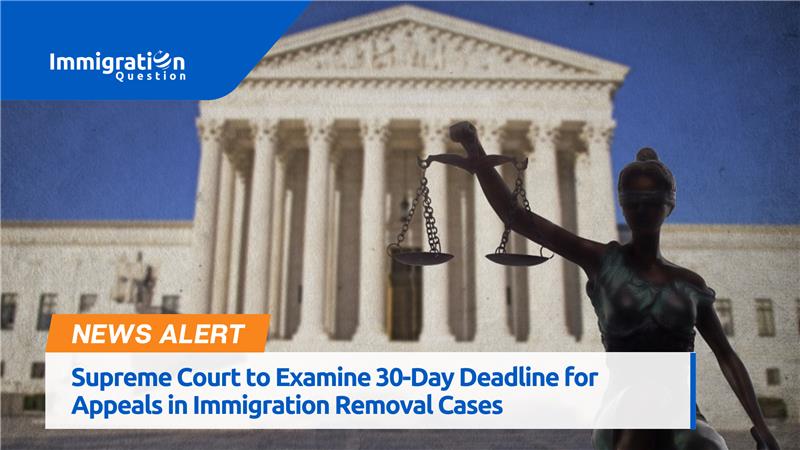Supreme Court to Examine 30-Day Deadline for Appeals in Immigration Removal Cases
In a case that could have far-reaching implications for noncitizens at risk of deportation, the U.S. Supreme Court will hear arguments regarding the strict 30-day deadline for filing appeals in immigration removal cases. The case, initiated by Pierre Riley, a Jamaican national facing deportation, raises questions about due process for individuals issued with removal orders and facing potentially life-threatening situations in their home countries. Riley, who claims he could face violence if returned to Jamaica, argues that missing the narrow appeal window should not automatically preclude him from obtaining judicial review.
Background of the Case
The 30-day deadline for filing appeals in immigration cases, established under federal law, is intended to expedite handling cases in the often-overburdened immigration system. However, advocates argue that this strict timeline disproportionately affects vulnerable individuals who may lack legal resources or knowledge to file timely appeals, potentially leading to unfair outcomes.
Riley’s case highlights the procedural hurdles for noncitizens seeking deportation relief. After serving a federal prison sentence for drug and firearm charges, he faced deportation. An immigration judge acknowledged his credible fear of returning to Jamaica, making him eligible for protection under the United Nations Convention Against Torture (CAT). However, in April, the Fourth Circuit ruled it had no jurisdiction to review Riley’s claim against the Board of Immigration Appeals (BIA) for upholding his removal since he did not appeal the initial DHS removal order in January 2021. This distinction closed his appeal window after the DHS order, barring a later appeal based on CAT relief denial.
This case challenges whether courts should be able to review cases filed after 30 days, particularly when deportation could harm the appellant.
Legal and Human Rights Implications
If the Supreme Court favours Riley, it could alter how lower courts handle appeals from immigrants who fail to meet the 30-day deadline, potentially allowing more cases to receive judicial review even if they miss procedural deadlines. The case also underscores the significant procedural challenges that noncitizens face within the U.S. immigration system. Advocates, including the American Civil Liberties Union (ACLU), argue that the strict deadline can undermine immigrants’ right to due process, especially for individuals without adequate legal representation.
A favourable ruling for Riley could mean greater judicial discretion in immigration cases, providing relief for those who might face undue harm or persecution if removed. Such an outcome could also bring the U.S. immigration appeal process more in line with human rights standards that call for fairness and due process in all judicial proceedings.
Looking Ahead – Potential Impact on the Immigration System
The Supreme Court’s decision in this case could have a ripple effect on thousands of immigration cases annually, as many immigrants cannot meet strict filing deadlines due to various factors such as a lack of legal knowledge, language barriers, and limited access to resources. This case has caught widespread attention due to its implications on the broader immigration system, with legal experts and immigrant rights organizations watching closely. Relaxing the deadline could help ensure that all immigrants receive a fair opportunity to present their cases and prevent hasty removals that could endanger lives.
The Supreme Court ruling will clarify the legal stance on deadlines in immigration appeals and potentially set a precedent for future cases. A change in this area of law could also influence policies on procedural deadlines in other places, enhancing access to justice for all individuals within the U.S. legal system.
To stay updated and informed, keep an eye out for our news section or drop your immigration queries for professional attorneys to reply on Immigration Question.










